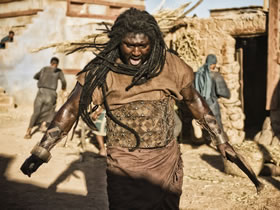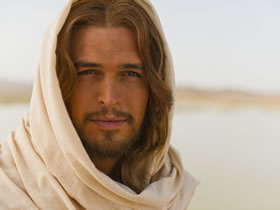Episode 3: Hope
From the fall of Jerusalem, through the devotion of Daniel and the birth of Jesus to the calling of Peter, we might think about the big themes of faith and life.
Like all texts recorded within a community the Bible provides insight into the beliefs and values of the community members.
Why does King Zedekiah refuse to listen to Jeremiah's warnings, and what motivates the prophet to persevere in warning him?
Sometimes it is easier to believe a comforting lie than the uncomfortable truth. Zedekiah chooses to listen to people that tell him good news and ignore the bad news that Jeremiah has for him. Jeremiah is committed to serving God whatever the consequences and so perseveres in delivering his message to the deaf ears of the King.
- Zedekiah is a puppet king, installed by the Babylonians after their capture of his nephew King Jehoiachin in 597 BC. He seems to be considering rebellion from early in his eleven-year reign.
- Many prophets tell Zedekiah that he will break free from the Babylonians and have peace, but Jeremiah says that they are prophesying lies (see Jeremiah 27:11–15).
- Jeremiah continues to warn Zedekiah that he should submit to the Babylonians as this is the means by which God is punishing Judahfor their long history of worshipping false gods.
- The Old Testament prophets consistently denounce the nation for trusting in false gods and political alliances, rather than in God:
-
- '"But my people have exchanged their glorious God for worthless idols. Be appalled at this, you heavens, and shudder with great horror," declares the Lord. "My people have committed two sins: They have forsaken me, the spring of living water, and have dug their own cisterns, broken cisterns that cannot hold water."' (Jeremiah 2:11–13).
- In the New Testament, the early church is equally clear that idolatry is incompatible with faith in Jesus:
-
- 'We know also that the Son of God has come and has given us understanding, so that we may know him who is true. And we are in him who is true by being in his Son Jesus Christ. He is the true God and eternal life. Dear children, keep yourselves from idols.'
What beliefs and values are important to Daniel and his friends, and how are these challenged during their exile in Babylon?
Once again, we see in Daniel and his friends an uncompromising and courageous trust in God despite facing mortal danger.
- Daniel and his friends grew up in Judah with a strong commitment to, and trust in, God.
- They were taken to Babylon to be trained to serve in the Babylonian administration, which meant they were expected to take on Babylonian culture and beliefs.
- Regardless of the consequences, Daniel and his friends refuse to allow themselves to be corrupted by the pagan culture:
-
- 'If we are thrown into the blazing furnace, the God we serve is able to deliver us from it, and he will deliver us from Your Majesty's hand. But even if he does not, we want you to know, Your Majesty, that we will not serve your gods or worship the image of gold you have set up.' (Daniel 3:17–18)
- New Testament Christians display the same commitment to putting God above their personal safety:
-
- 'The apostles left the Sanhedrin, rejoicing because they had been counted worthy of suffering disgrace for the Name.' (Acts 5:41)
What kind of hope does Jesus represent to people in the community around him?
Jesus brings hope of the justice and peace of God being revealed in the here and now. His message "the kingdom of God is near: repent and believe the good news" summarised neatly the promise that God's kingly reign is coming to put things right in the world and that we need to prepare ourselves for its arrival.
- Centuries before Jesus, several Old Testament prophets looked forward to God sending his people a rescuer – the anointed one or Messiah (or Christ, from the Greek translation of Messiah):
-
- 'But you, Bethlehem Ephrathah, though you are small among the clans of Judah, out of you will come for me one who will be ruler over Israel, whose origins are from of old, from ancient times. . . . He will stand and shepherd his flock in the strength of the Lord, in the majesty of the name of the Lord his God. And they will live securely, for then his greatness will reach to the ends of the earth. (Micah 5:2–4)
- In Jesus's time, there is a high level of expectation that the Messiah would come soon and liberate them from the Roman oppressors.
- When Jesus begins to teach and perform miracles, people begin to think that he must be this long-awaited Messiah:
-
- 'On hearing his words, some of the people said, "Surely this man is the Prophet." Others said, "He is the Messiah." Still others asked, "How can the Messiah come from Galilee? Does not Scripture say that the Messiah will come from David's descendants and from Bethlehem, the town where David lived?" Thus the people were divided because of Jesus.' (John 7:40–43)
What initial impression do we get of Peter and his priorities in life? What contrasting perspective does Jesus seem to have about life's possibilities?
Peter is initially focused only on survival in a harsh world. Jesus offers him a new name, a new purpose and a new character. Now he can really make a difference in the world.
- Peter's original name was Simon, but Jesus gave him his new name (Cephas in Aramaic), which means 'rock' (see Matthew 16:18). He was part of the inner circle of Jesus's disciples, along with James and John (see Mark 9:2, for example).
- Throughout the Gospels, Peter is seen as a fiercely loyal, but impulsive, follower of Jesus. Just before his arrest, Jesus tells the disciples that they will all fall away, but Peter insists he will not:
-
- 'Peter said to him, "Even though they all fall away, I will not." And Jesus said to him, "Truly, I tell you, this very night, before the rooster crows twice, you will deny me three times." But he said emphatically, "If I must die with you, I will not deny you."' (Mark 14:29–31)
- Jesus rebukes Peter for having a wrong understanding of how the Messiah is to function (see Mark 8:31–33). He had failed to understand Isaiah's prophecy of the Messiah as a 'suffering servant':
-
- 'But he was pierced for our transgressions, he was crushed for our iniquities; the punishment that brought us peace was on him, and by his wounds we are healed.We all, like sheep, have gone astray, each of us has turned to our own way; and the Lord has laid on him the iniquity of us all.' (Isaiah 53:5–6)






